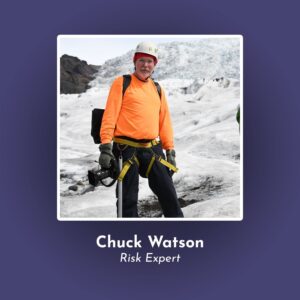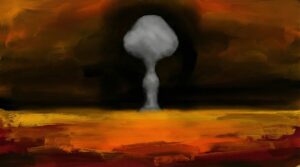
Show Summary
On this episode, Nate is re-joined by risk expert Chuck Watson for a candid discussion of recent news regarding the nuclear developments between Russia and the United States. As the world’s attention is focused on the events in the Middle East, US testing and development of new nuclear weapons and Russia’s decision to pull out of the Nuclear Test Ban Treaty last week have been overlooked and underreported by major media. Yet, in the bigger picture these trends represent some of the most imminent risks to life on Earth as we know it. What is the history behind this framework of trust that took decades to develop, and how quickly might our current fear spiral destroy it? Are the people in positions of power aware of the dangers of this situation and acting with appropriate caution? What should concerned individuals and leaders understand and advocate for to minimize this truly existential risk?
About Chuck Watson
Chuck Watson has had a long career in military and intelligence work, with a specialty in natural and human made disaster modeling. He worked for the US Air Force, was an attache to US Ambassadors to the Middle East Robert McFarland, and Secretary of Defense Donald Rumsfeld as a Soviet expert. Chuck has worked as an advisor to the military for over four decades with a particular emphasis on big data, open source intelligence, with an emphasis on the Soviet Union and Russia. Chuck is also the founder and Director of Research and Development of Enki Holdings, LLC, which designs computer models for phenomena ranging from tropical cyclones (hurricanes) and other weather phenomena, earthquakes, and tsunamis, as well as anthropogenic hazards such as industrial accidents, terrorism, and weapons of mass destruction.
In French, we have a motto that says that a simple drawing is often better than a long explanation. Jean-Marc Jancovici Carbone 4 President
That’s very understandable because with left atmosphere thinking, one of the problems is that you see everything as a series of problems that must have solutions. Iain McGilchrist Neuroscientist and Philosopher
We can’t have hundreds and hundreds of real relationships that are healthy because that requires time and effort and full attention and awareness of being in real relationship and conversation with the other human. Nate Hagens Director of ISEOF
This is the crux of the whole problem. Individual parts of nature are more valuable than the biocomplexity of nature. Thomas Crowther Founder Restor
Show Notes & Links to Learn More
Download transcript00:00 – Chuck Watson Info, Past Episodes, Supplemental Reading from Chuck, Chuck Watson response to alternative view from Pavel Podvig published November 8th, 2023
00:27 – Russia withdrawal from the Comprehensive Nuclear-Test-Ban Treaty, US testing nuclear weapons
03:10 – Carl Shurz
04:42 – US lack of no-first-use doctrine, cases for first use
08:08 – Subcritical test
08:29 – Non-proliferation
09:02 – US developing a new class of high-yield nuclear weapons
10:10 – China isn’t a part of the Nuclear Test Ban Treaty
11:52 – U.S. Treaty signing process
12:40 – Russian Government System
14:07 – Anti-ballistic Missile Treaty
14:23 – Intermediate Range Nuclear Forces Treaty
15:45 – Open Skies Treaty
15:59 – Cold War
16:47 – Law of the Seas, list of treaties that the US has signed but never ratified
18:27 – Oppenheimer
19:20 – Sexual Selection
21:46 – Little Boy Bomb
22:58 – Number of nuclear warheads
23:10 – DOD Press Release Oct 27th
27:53 – China’s stance on nuclear safety measures
28:40 – Dedollarization
31:33 – Proud Prophet
33:57 – Anti-war movement
35:40 – War on Terror
36:19 – Destruction in Gaza
36:44 – Dial-a-yield
37:25 – Secretary of State Blinken
40:52 – Jake Sullivan, General Austin
42:08 – Two State Policy
42:39 – Israel Nuclear Use Policy and arsenal
44:33 – Strategic ambiguity
48:36 – Hezbollah
55:06 – Johnny Carson Show, Ed McMahone
More:
‘Buying influence’: top US nuclear board advisers are tied to arms business






